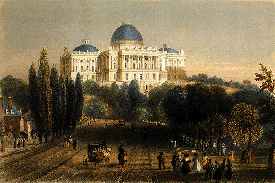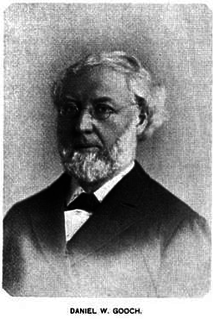Related Research Articles

The 16th United States Congress was a meeting of the legislative branch of the United States federal government, consisting of the United States Senate and the United States House of Representatives. It met in Washington, D.C. from March 4, 1819, to March 4, 1821, during the third and fourth years of James Monroe's presidency. The apportionment of seats in the House of Representatives was based on the Third Census of the United States in 1810. Both chambers had a Democratic-Republican majority.

John Holmes was an American politician. He served as a U.S. Representative from Massachusetts and was one of the first two U.S. Senators from Maine. Holmes was noted for his involvement in the Treaty of Ghent.
Non-voting members of the United States House of Representatives are representatives of their territory in the House of Representatives, who do not have a right to vote on proposed legislation in the full House but nevertheless have floor privileges and are able to participate in certain other House functions. Non-voting members may vote in a House committee of which they are a member and introduce legislation. There are currently six non-voting members: a delegate representing the District of Columbia, a resident commissioner representing Puerto Rico, and one delegate for each of the other four permanently inhabited U.S. territories: American Samoa, Guam, the Northern Mariana Islands, and the U.S. Virgin Islands. A seventh delegate, representing the Cherokee Nation, has been formally proposed but not yet seated, while an eighth, representing the Choctaw Nation, is named in a treaty but has neither been proposed nor seated. As with voting members, delegates are elected every two years, while the resident commissioner of Puerto Rico is elected every four years.

Elections in Hong Kong take place when certain political offices in the government need to be filled. Every four years, ninety representatives are chosen to sit on the unicameral Legislative Council of Hong Kong. Twenty seats representing the geographical constituencies are returned by the electorate, thirty seats representing the functional constituencies are elected through smaller closed elections within business sectors, and the remaining forty seats representing the Election Committee constituency are chosen by members of the Election Committee.

Elections to the United States House of Representatives for the 17th Congress were held at various dates in different states between July 1820 and August 1821 as President James Monroe won reelection unopposed.

Elections to the United States House of Representatives for the 2nd Congress took place in 1790 and 1791, in the middle of President George Washington's first term. While formal political parties still did not exist, coalitions of pro-Washington (pro-Administration) representatives and anti-Administration representatives each gained two seats as a result of the addition of new states to the union.
Joseph Dane was a United States Representative from Maine, serving from 1820 to 1823.

Daniel Wheelwright Gooch was a United States Representative from Massachusetts.
The Constitution of the State of Maine established the "State of Maine" in 1820 and is the fundamental governing document of the state. It consists of a Preamble and ten Articles (divisions), the first of which is a "Declaration of Rights".

Enoch Lincoln was an American politician, serving as U.S. Representative from, successively, Massachusetts and from Maine. He was the son of Levi Lincoln Sr. and his wife, and the younger brother of Levi Lincoln Jr. Born in Worcester, Massachusetts, Lincoln graduated from Harvard College in 1807. He was elected and served as Governor of Maine from 1827 until his death in October 1829.
The United States Senate elections of 1820 and 1821 were elections for the United States Senate that, corresponding with James Monroe's landslide re-election, had the Democratic-Republican Party gain one-to-five seats, assuming almost complete control of the Senate.

The 1814 United States House of Representatives elections in New York were held from April 26 to 28, 1814, to elect 27 U.S. Representatives to represent the State of New York in the United States House of Representatives of the 14th United States Congress.

The 1826 United States House of Representatives elections in New York were held from November 6 to 8, 1826, to elect 34 U.S. Representatives to represent the State of New York in the United States House of Representatives of the 20th United States Congress.

A special election was held in Massachusetts's 20th congressional district on March 16, 1818 to fill a vacancy left by the resignation of Albion K. Parris (DR) on February 3, 1818 after being named a judge of the United States District Court for the District of Maine.
A special election was held in Massachusetts's 1st congressional district on October 23, 1820 to fill a vacancy created by the resignation of Jonathan Mason (F) on May 15, 1820. As a majority was not achieved on the first ballot, a second ballot was held November 6, 1820
A special election was held in Massachusetts's 8th congressional district on October 16, 1820 and November 24, 1820 to fill a vacancy caused by the resignation of Zabdiel Sampson (DR) on July 26, 1820.
A special election was held in 1820 in Massachusetts's 13th congressional district to fill a vacancy caused by the resignation of Edward Dowse (DR) on May 26, 1820
A special election was held in Massachusetts's 10th congressional district on September 8, 1823 to fill a vacancy created by the resignation of William Eustis (DR) prior to the start of the 18th Congress.

This was the first election in Maine since its separation from Massachusetts. In the previous election, Massachusetts had had 20 representatives. Seven seats were reassigned from Massachusetts to Maine. In addition, under the terms of the law which admitted Maine to the union, any vacancies in the 16th Congress by Representatives elected to represent Massachusetts but residing in the new states of Maine would be filled by a resident of Maine. John Holmes, who had been elected to the House for the former 14th district of Massachusetts was elected as one of the first two senators for Maine. The vacancy was filled in a special election by Joseph Dane (Federalist). Dane was the only Representative officially considered as representing Maine in the 16th Congress. The Representatives from the 15th-20th districts were still classified as being from Massachusetts for the remainder of the 16th Congress.
References
- ↑ "… in the election of Representatives in the Seventeenth Congress, the State of Massachusetts shall be entitled to choose 13 Representatives only; and the State of Maine shall be entitled to choose seven Representatives, That if the seat of any of the Representatives in the present Congress (Sixteenth), who were elected in and under the authority of the State of Massachusetts, and who are now inhabitants of the State of Maine, shall be vacated by death, resignation, or otherwise, such vacancy shall be supplied by a successor, who shall, at the time of his election, be an inhabitant of the State of Maine."
- ↑ Election details from Ourcampaigns.com
- ↑ 16th Congress Membership roster Archived March 9, 2013, at the Wayback Machine